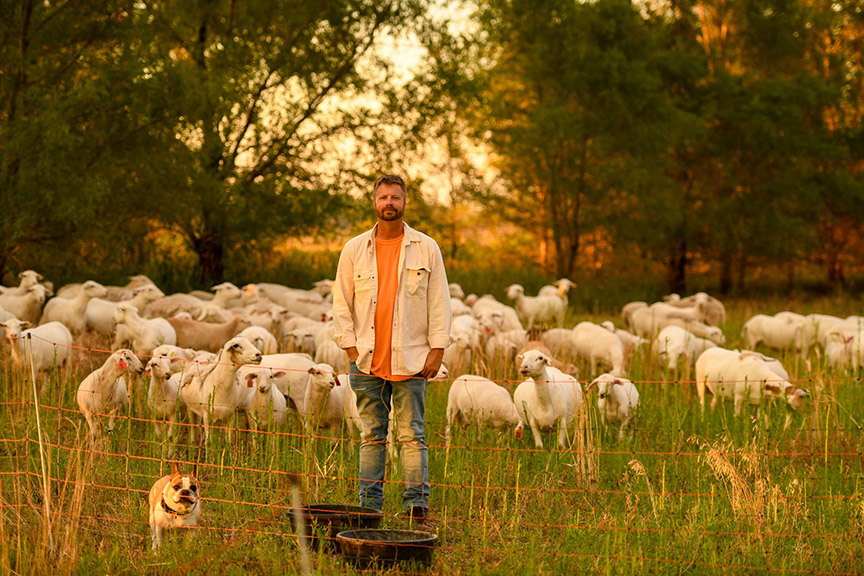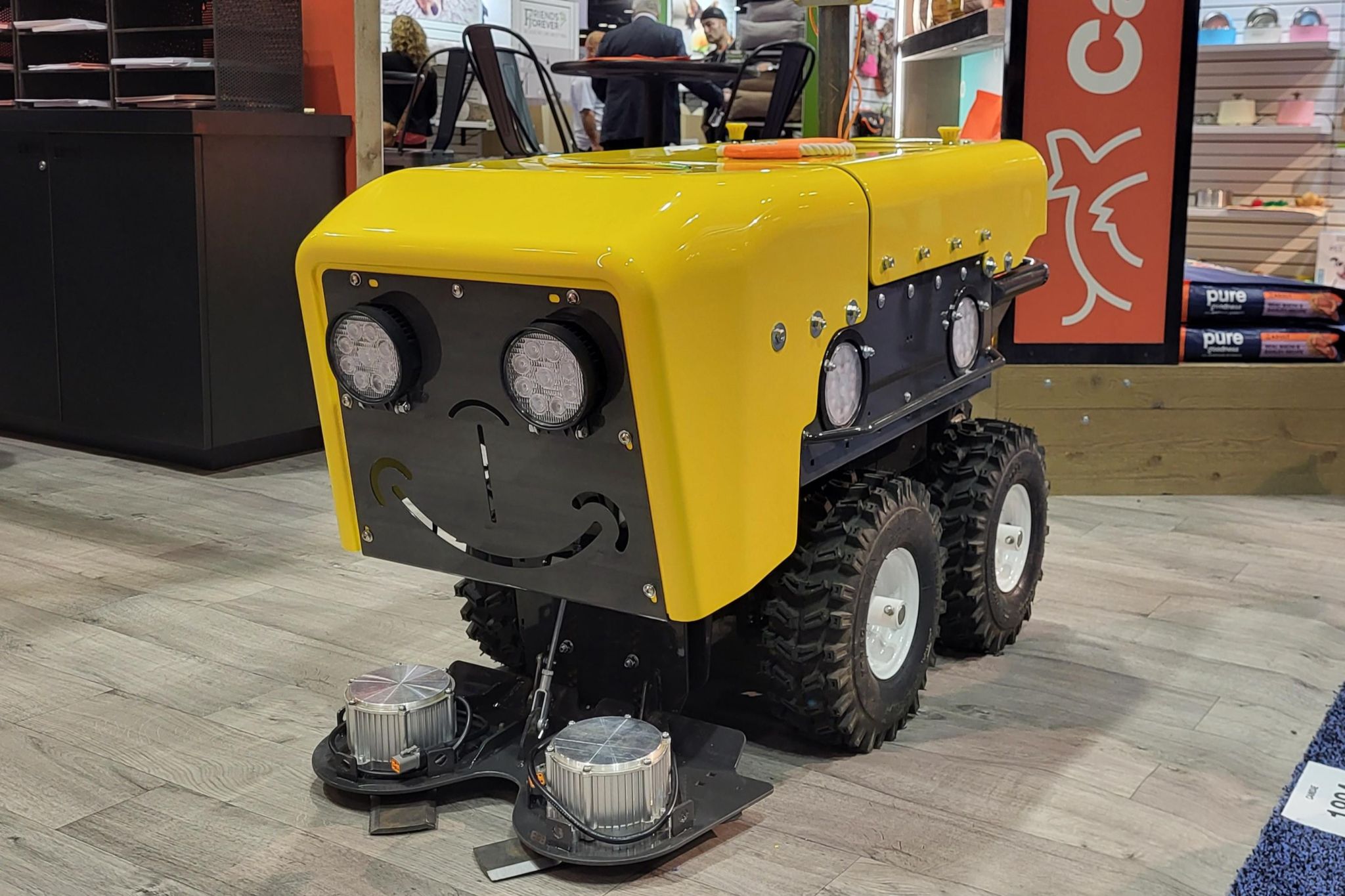Greenfield, Inc.’s “WeedBots” cut weeds down to size, help farmers reduce herbicide use
Biotechnology companies have put farmers on an herbicide treadmill. Weeds have developed resistance to glyphosate, the most widely used herbicide. The companies then introduced crops that are genetically modified to tolerate dicamba and 2,4-D herbicides. But both of those herbicides are prone to drifting in the air for miles, killing other crops, gardens, and trees. An even bigger problem is that herbicides are toxic. Glyphosate is linked to cancer, endocrine disruption, negative reproductive outcomes, and liver and kidney diseases. And glyphosate is considered the most “benign” herbicide.
Clearly, a better—and safer—weed management solution is needed. A company in Kansas thinks they have a solution. Greenfield, Inc. has developed a fleet of “WeedBots,” small robots that move through fields of crops like soybeans and mechanically cut down weeds.
How to combine the best of conventional and organic
Greenfield founder and third-generation farmer Clint Brauer says he got the idea to develop a better method for weed control when his father suffered from Parkinson’s disease.
“I did some research and thought there is a good chance his Parkinson’s was from herbicides because he used them. I thought ‘How do we get rid of this stuff?’”
That was in 2010 and Brauer, who had a successful career in startups and technical businesses in California, decided to move back to the family farm in Haven, Kansas and help his father. He started farming, growing vegetables and using only organic approved inputs. But he found it challenging to grow vegetables in south central Kansas with its dry climate.
So, Brauer switched to growing row crops—wheat, milo/sorghum, and soybeans but faced challenges with weeds, particularly pigweed, which have stems as big as baseball bats and produce millions of seeds. He didn’t want to use herbicides but also didn’t want to grow organically because of its reliance on tillage. Brauer wanted to combine the best of conventional and organic methods.
“The problem with conventional is the herbicides, and then with organic, there’s a lot of tillage,” he says. “How do we get no-till regenerative farming without chemicals and take the good things about organic and bring it all together and scale it?”
Developed the WeedBot to cut weeds down to size
This led Brauer to develop the WeedBot technology in 2018. He came up with the idea of a robot to remove weeds mechanically. He designed the WeedBot to go down the rows between crops and cut weeds to about one-half inch using spinning blades. The robots travel three and a half miles per hour and weigh about 200 pounds.
“It’s not perfect but it works,” Brauer says.
Brauer began offering the WeedBots as a service to farmers in 2020. “I figured out a model for farmers to hire us on a per acre basis, and discovered that there’s a weed problem for a lot of farmers,” he says.
Right now, the WeedBots work on soybean and milo fields; Breuer plans to expand that to fields of oats and peas.
“Anything that’s a 30-inch row crop we can potentially run on at this stage,” Brauer says.
The WeedBots can weed fields of 40 to 160 acres. With 10 robots in a field, Brauer says they could weed 100 acres a day though the technology is not yet capable of handling large farms of 10,000 acres or more. This year, he plans to expand the number of Weedbots to 20 and cover 6000 acres.
Farmers like the technology. “We’ve definitely seen farmers want to use our little robots,” Brauer says.
One of those farmers is Torrey Ball, from Buhler, Kansas. Ball has used the WeedBots on his soybeans for the past two years.
“I like the idea of using less chemicals if we can,” he says.
Ball says Greenfield has steadily improved the WeedBot technology. “They are getting better every year. This year, they’ve rebuilt them with new software and made major improvements.”
Ball has been able to reduce his herbicide use with the WeedBots. “We’ve cut at least one crop pass with Liberty and Roundup (herbicides) each year. That’s paid for the robots.”
This year, Ball plans to use the robots on 150 acres of milo and 225 acres of soybeans.

Clint Brauer, founder of Greenfield, Inc. and developer of WeedBot technology
Building regenerative supply chains direct to food brands
Greenfield has a partnership with MKC Co-op , a 10,000-member co-op in Moundridge, Kansas, to provide WeedBot weeding services to its farmers. Three-quarters of Greenfield’s business this year will come from MKC farmers.
On his farm, Brauer is supplying two companies, plant-based baking mix manufacturer Snaktivist and pet food manufacturer Canidae, with milo. This year, he plans to grow 700 acres of milo for the two companies and will use the WeedBots on his fields.
Brauer wants to build supply chains for food companies like Snaktivist, supplying them directly with grains from fields that are grown using regenerative agriculture methods, including the use of WeedBots.
A growing number of food companies are sourcing grains and seeds directly from farmers. These include Quinn Snacks , Simple Mills , Moonshot Snacks , Applegate Farms , and others. Such relationships shorten supply chains and provide more transparency to consumers.
“That’s really what we’re trying to do, build something where consumers win and farmers win,” Brauer says.
Brauer wants to advance regenerative agriculture and create more direct farmer-to-brand relationships. But first, he wants to get rid of the pesticides.
“The focal point is to get these herbicides out of the mix. I think they do a lot more damage than we realize,” he says.
Brauer also has bigger plans for his robot technology. In the works are more bots for cleaning fields prior to planting, planting cover crop seeds, testing soils for chemicals, nutrients, and carbon sequestration, and rotational grazing.
“Our ultimate goal,” he says, “is to bring complete transparency from the farmer to the consumer without any chemicals, period.”









